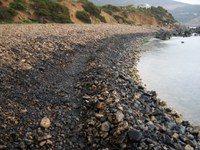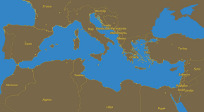Project description

Preparedness in marine pollution and civil protection is a crucial element for a prompt and efficient response to a pollution incident at sea.
Past incidents have showed the importance of a high level of awareness and training for the professionals and volunteers involved in the response process. Delays and lacks of training significantly increase the environmental impact on shorelines and fauna during a marine pollution. In the Mediterranean Sea, this issue is even more relevant due to its rich biodiversity and the high economic value generated by activities on its coastal areas.
In this respect, the projects POSOW I and POSOW II focus on six main aspects of preparedness in marine pollution: Management of Volunteers, Oiled Shoreline Assessment, Shoreline Cleancleaup, Wildlife Response operations, Response to an oil spill at sea in coastal waters with local fishermen assistance: using small vessels of opportunity, and Oil spill waste management.
“ Volunteers: From oil-polluted shoreline survey and cleanup… “
When an incident occurs it is crucial to undertake immediately after an oil spill and during the cleanup operations, detailed and complete shoreline surveys in view of enabling decision makers to plan their response strategy. Pre-trained personnel are therefore required to carry out the survey and/or to train other surveyors should the shoreline affected be of national dimension.
Once the situation is understood and the shoreline cleanup operations are carried out, volunteers may be required to assist onsite. The POSOW I and POSOW II projects deal with the training and supervision of volunteers, which is essential as far as safety is concerned but also from an economic and environmental perspective. For instance, inadequate shoreline cleanup operations such as excessive removal of clean sand by non-trained personnel could increase oily waste quantity, of which treatment and disposal are very expensive and could also have an impact on coastal erosion.
“ … to oiled wildlife interventions... “
Though the Mediterranean only covers 0.7% of the world’s ocean area it is one of the major reservoirs of marine and coastal biodiversity, with 28% of endemic species and 7.5% of
the world’s marine fauna and 18% of its marine flora. This small semi-enclosed sea is rich in islands and underwater beds and is also a major area of wintering, reproduction and migration for many birds, marine mammal and sea turtle species of conservation importance. These species being threatened by marine pollution which does not happen every day, national stakeholders in such an emergency situation are normally not used to dealing with large numbers of oiled animals. Moreover the practical skills and experience of dealing with oiled wildlife often lies with NGOs or charitable organisations, rather than the authorities. The project aims at providing a safe and effective wildlife response by the training of personnel from the local community of non-governmental organisations to be identified and integrated into a national response system.
“ … throughout the marine pollution response process. “
Based on the direct experience gained during POSOW I project, it was agreed to increase the outreach of the project by including two new topics, namely “Fishermen’s support in oil spill response” and “Oil spill waste management", as well as updating the existing training material, making the POSOW projects more comprehensive throughout the marine pollution response process.


